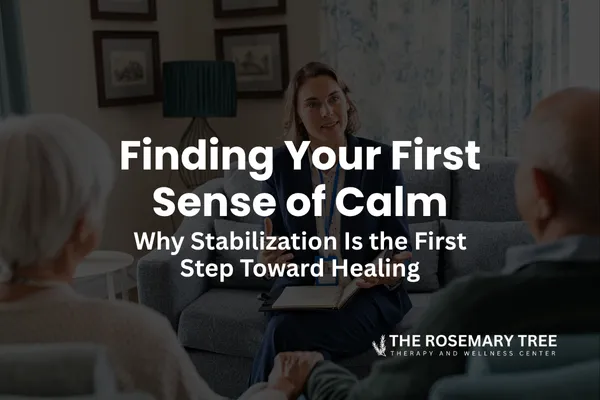
Finding Your First Sense of Calm: Why Stabilization Is the First Step Toward Healing
When Everything Feels Like Too Much
After betrayal, it can feel impossible to calm down. Your mind races, your chest tightens, and your emotions swing between anger, grief, and disbelief. The pain can be so overwhelming that even small decisions feel impossible.
This is the body’s natural response to trauma. When trust breaks, your nervous system floods with stress hormones, keeping you on alert for danger. Healing cannot begin until your body feels safe again, and that begins with stabilization.
What Stabilization Really Means
Stabilization is the process of helping your body and emotions return to a manageable state after trauma. It is not the same as forgiveness or reconciliation. It is simply learning how to breathe again, both physically and emotionally.
For couples in crisis, stabilization creates the foundation for every step that follows. Without it, conversations spiral, decisions are made in panic, and both people remain trapped in survival mode.
Why the Nervous System Needs Time
After discovery, your nervous system is overwhelmed. The logical part of your brain temporarily shuts down so your body can focus on protection. That is why you may feel scattered, forgetful, or physically ill.
The key to stabilization is time and gentleness. You cannot rush calm. It returns slowly through repeated experiences of safety.
How to Begin Finding Your First Calm
Focus on Breathing and Grounding
Simple, slow breaths can help signal safety to your body. Try placing a hand on your chest and one on your stomach. Breathe in slowly through your nose for four counts, hold for two, and release through your mouth for six. Repeat until you feel your shoulders relax slightly.Create a Sense of Predictability
Trauma thrives in chaos. Structure your days with small routines, consistent wake-up times, meals, and breaks. Predictability helps the nervous system feel more secure.Limit Triggering Conversations
During the early days, you do not need to discuss every detail or make major decisions. Wait until you feel grounded enough to stay calm. Boundaries are not avoidance; they are protection for your healing.Nourish Your Body
Even when you have no appetite, gentle nourishment supports recovery. Hydrate, eat simple foods, and allow yourself rest. The body heals the mind.Seek Safe Support
Talk with a therapist, close friend, or faith-based counselor who understands trauma and can listen without judgment. You do not have to process this alone.
For the Partner Who Caused the Pain
You may feel a strong urge to fix things quickly. While that desire is understandable, it can often overwhelm your partner even more. Stabilization means learning to pause your need to act and instead focus on becoming a safe, steady presence.
You can do this by:
Listening quietly without defending yourself
Allowing space when your partner needs it
Keeping promises and following through on small commitments
Regulating your own emotions before speaking
Your calm becomes part of the healing environment.
How Therapy Intensives Help Create Stability
Our Accelerated Deep-Work Therapy Intensives were created for couples who need space, time, and professional guidance to stabilize before diving into deeper work.
During an intensive, you and your partner can:
Learn grounding and co-regulation tools
Understand the nervous system’s trauma response
Identify emotional triggers and create safety plans
Begin communicating with compassion instead of reactivity
Build a personalized roadmap for next steps in healing
These focused sessions offer couples the space to exhale, reflect, and start rebuilding stability together.
When Calm Feels Out of Reach
If you have tried everything and still feel anxious or on edge, know that this is normal. Healing after betrayal is not linear. Some days you will feel steady; others may bring the pain back in waves. This does not mean you are failing. It means your body is still protecting you.
With time, practice, and the right support, those waves begin to soften.
Final Thoughts
Healing begins not with forgiveness, but with calm. Before you can rebuild your relationship, you must first rebuild your sense of safety. Stabilization is not the end of the story, it is the foundation for everything that comes next.
If you are ready to find your first sense of calm, we would love to support you. You can reach out to us here, and our team will connect with you to talk about what this process could look like. There is no pressure, only care and a space to begin finding peace again.


